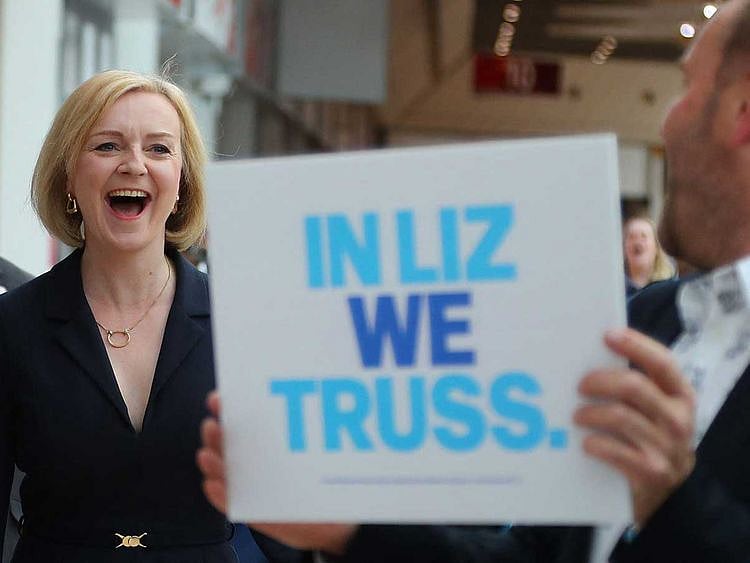In electing Volodymyr Zelensky as their president, Ukrainians chose a TV actor and got a charismatic Winston Churchill. In electing Boris Johnson, Britons did the opposite: They chose a Churchill wannabe and got a leader with a propensity for scandal.
Now that Britain’s ruling Conservative Party has replaced Johnson with Liz Truss, a prime minister who models herself on Margaret Thatcher, it’s anybody’s guess how she’ll turn out. But if we are being charitable, she may combine a bit of Thatcher with some part of that steely German pragmatist, Angela Merkel.
The Thatcher parallel is revealing — though it has its limits. Like her hero, Truss, 47, does not hail from the privileged wing of the ruling Conservative Party. She attended a government school, shone academically, and studied at Oxford. In imitation of Thatcher, she appeared at the first candidates’ debate in July wearing a white shirt with a bow on the front. Asked to name a character flaw, Truss might have been channelling the Iron Lady when she admitted to being “a bit relentless.”
Like Thatcher, Truss assumes power when her country is in the dumps. In 1979, Britain was seen as “the sick man of Europe.” That year, inflation topped 13% and the country lost 29 million work days to strikes.
Today, inflation approaches the same level and railway workers, nurses, garbage collectors, postal workers, teachers and civil servants are all either striking or planning to do so. Soaring natural gas prices have triggered a cost-of-living crisis. On Oct. 1, household energy bills are set to jump 80% unless Truss does something. That would come on top of a 54% rise that happened in April.
Truss also appears unbothered by what other people think. She shares her mentor’s suspicion of the government’s reliance on career experts. She has been known for rough handling of sensitive issues at times, but as foreign secretary and trade secretary she had a reputation for getting stuff done.
She has chosen a time of rising prices to promise tax cuts and extra government spending, combining that inflationary cocktail with an attack on the reputation of the Bank of England. But perhaps a willingness to shock is what today’s sick man of Europe needs now. When Truss criticises the mandarins for not doing enough to boost Britain’s economic dynamism, she has a point.
Yet there is also a key difference between Thatcher and Truss. Thatcher was a conviction politician. Truss, by all appearances, is not. Some of her U-turns reflect her passage to maturity — it scarcely matters that, as a student, she was a Liberal Democrat rather than a Conservative, or that as a child she accompanied her activist mother to anti-nuclear protests. But her transformation from anti-Brexit Remainer to firm foe of Europe is decidedly un-Thatcheresque. Remarkably, she now poses as a champion of her party’s pro-Brexit right.
Leaders tend to prosper by eliciting respect or love. The worry with Truss is that she may not be charming enough to inspire love. Thanks to YouTube, you can still watch her hilariously wooden 2014 speech on the glories of British farming.
Her delivery has since improved, but modestly: In her victory speech on Monday, the punchlines were so flat that the audience of party loyalists was not sure when to clap. Like any national leader, Britain’s prime minister is expected to hold forth frequently in public. This won’t come easily to Truss.
Nor does it bode well that, in the first part of the leadership contest, involving voting by Conservative members of Parliament, Truss proved far less popular than Rishi Sunak, the former finance minister.
She owes her victory not to the judgement of members of Parliament who work with and know her, but rather to the support of fewer than 100,000 dues-paying party members who are by a wide margin older, wealthier and more conservative than the median voter.
Yet Truss has one important strength. She is driven rather than lazy, a fighter rather than a narcissistic prince. And this is where the Merkel model may be relevant. The former German chancellor was not charismatic. Yet she dominated German politics for 15 years. Her achievement shows how hard work and pragmatism can generate enduring political success.
Truss has been canny enough to land cabinet positions under all three of the recent Conservative prime ministers, despite the bitter divisions among them.
She has now landed the job that few thought she would ever get. And although she is unlikely to win the hearts of Britain’s voters, she will at least avoid alienating them with a careless habit of scandal. She may not be the Thatcher she aspires to be. But, by dint of determination and sound political instinct, she may still surprise.
Washington Post
Sebastian Mallaby is an English journalist and author. His books include The Man Who Knew (2016), The World’s Banker (2004).
Sign up for the Daily Briefing
Get the latest news and updates straight to your inbox
Network Links
GN StoreDownload our app
© Al Nisr Publishing LLC 2026. All rights reserved.
